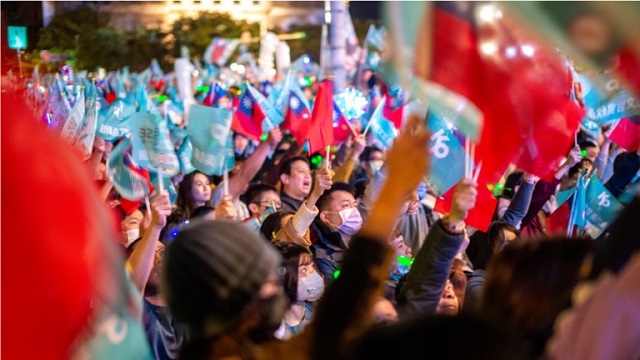International
In Taiwan’s election, voters refused to give in to Beijing’s relentless pressure

From the MacDonald Laurier Institute
By J. Michael Cole
Beijing will no doubt regard the results of Saturday’s elections as a further affront to its nationalistic pride.
Amid unprecedented attention from the international community and rising tensions in the Taiwan Strait, the people of Taiwan headed to the polls on Saturday to elect a new president and legislature. After months of intense campaigning and intimidation by China, Taiwanese voters elected to give the ruling Democratic Progressive Party (DPP) a third four-year term – the first time in the island nation’s democratic history that a party has remained in power for more than two consecutive terms.
Despite Beijing’s warning that a vote for the DPP candidate, Lai Ching-te, constituted a vote for “war,” the Taiwanese electorate chose continuity, with Mr. Lai vowing to continue the policies of President Tsai Ing-wen, who successfully navigated a difficult geopolitical environment over the past eight years. (Ms. Tsai will step down on May 20 after reaching her two-term limit.)
Wary of the Taiwan-centric DPP, Beijing has been relentless in its attempts to coerce Taiwan, both militarily and economically, and to isolate it from the international community while using various incentives to foster support for unification with the People’s Republic of China. Those efforts have been largely unsuccessful, and eight years on, Taiwan is arguably much more connected with the international community than it was under more Beijing-friendly governments.
Beijing will no doubt regard the results of Saturday’s elections as a further affront to its nationalistic pride, and we can therefore expect an intensification of its punitive measures at the economic and diplomatic level, as well as an intensification of its already highly destabilizing military activity around Taiwan. In response, the Lai administration will continue to strive to diversify its export destinations to further reduce its economic dependence in China, and, as one of the most vibrant democracies in the region, will remain an important partner to the U.S.-led community of democracies as it pushes back against resurgent authoritarianism. Under Ms. Tsai, Taiwan has played an important role as an example and promoter of liberal democracy, both within the region and abroad. Its government and vibrant civil society have expanded their footprint abroad, often helping other democracies, such as Canada, learn how to better balance their relationship with China so that trade and engagement does not come at the cost of corroded values and institutions.
While many domestic factors also weighed into who the Taiwanese decided to vote for in Saturday’s election, in which the DPP also lost its majority of seats in the Legislative Yuan, their vote for Mr. Lai signalled a desire for Taiwan to continue to play a larger role on the international stage. While potentially reducing tensions in the Taiwan Strait for some time, a victory by his two opponents would nevertheless have come at the cost of retrenchment on the international stage and greater focus on Taiwan’s relations with – and concessions to – China.
Still, despite ongoing efforts to modernize its military and develop a defence posture that is better suited to meet the challenge posed by the Chinese military, Taiwan’s ability to deter an invasion by the much more powerful People’s Liberation Army remains contingent on a U.S. commitment to its defence, as well as pressure from other countries making it clear to Beijing that any attempt to annex Taiwan by force and against the wishes of its 23.5 million people would come at an unacceptable cost.
Potential distractions caused by the ongoing war in Ukraine, the risks of a regional conflagration in the Middle East, an unpredictable North Korea and political instability in the U.S. could undermine American efforts to assist Taiwan and therefore embolden Beijing. The DPP’s loss of its majority in parliament could also complicate the new administration’s ability to secure the budgets it needs to fund defence modernization and foreign policy initiatives, which Beijing will no doubt seek to exploit.
There is every reason to believe that a Lai administration will build upon and continue to expand the course set by his predecessor. In the last eight years, Taiwan shone on the international stage, and consolidated its place as both a bastion of liberal-democratic values and an economic powerhouse whose technological prowess in fields such as semiconductors have positioned the country as an indispensable component of the global supply chain. And yet, this success story continues to be threatened by an authoritarian neighbour that rejects the reality that, whoever they vote for, the people of Taiwan categorically refuse to be ruled by Beijing. They cherish the freedom, democracy and way of life they have built over decades of arduous work. And they want their rightful place on the international stage.
J. Michael Cole is a Taipei-based senior fellow with the Macdonald-Laurier Institute in Ottawa and a senior adviser on countering foreign authoritarian influence with the International Republican Institute. He is also a former analyst with the Canadian Security Intelligence Service.
Business
Too nice to fight, Canada’s vulnerability in the age of authoritarian coercion

By Stephen Nagy for Inside Policy
Beijing understands what many Canadians still resist: that our greatest national virtues, including our desire to be an “honest broker” on the world stage, have become our most exploitable weaknesses.
On December 1, 2018, RCMP officers arrested Huawei CFO Meng Wanzhou at Vancouver International Airport. As Canadians know well, within days, China seized two Canadians, Michael Kovrig and Michael Spavor, on fabricated espionage charges. For 1,019 days, they endured arbitrary detention while Canada faced an impossible choice of abandoning the rule-of-law or watching its citizens suffer in Chinese prisons.
This was hostage diplomacy. But more insidiously, it was also the opening move in a broader campaign against Canada, guided by the ancient Chinese proverb “借刀杀人” (Jiè dāo shā rén), or “Kill with a borrowed knife.” Beijing’s strategy, like the proverb, exploits others to do its bidding while remaining at arm’s length. In this case, it seeks to exploit Canadian vulnerabilities such as our resource-dependent economy, our multicultural identity, our loosely governed Arctic territories, and our naïve belief that we can balance relationships with all major powers – even when those powers are in direct conflict with one another.
With its “borrowed knife” campaign, Beijing understands what many Canadians still resist: that our greatest national virtues, including our desire to be an “honest broker” on the world stage, have become our most exploitable weaknesses.
The Weaponization of Canadian Niceness
Canadian foreign policy rests on the Pearsonian tradition. It is the belief that our lack of imperial history and (now irrelevant) middle-power status uniquely positions us as neutral mediators. We pride ourselves on sending peacekeepers, not warfighters. We build bridges through dialogue and compromise.
Beijing exploited this subjective, imagined identity. When Canada arrested Meng pursuant to our extradition treaty with the United States, Chinese state media framed it as Canada “choosing sides” and betraying its honest broker role. This narrative trapped Canadian political culture. Our mythology says we transcend conflicts through enlightened multilateralism. But the modern world increasingly demands choosing sides.
When former Prime Minister Jean Chrétien and former Ambassador John McCallum advocated releasing Meng to free the “Two Michaels,” they weren’t acting as Chinese agents. They were expressing a genuinely Canadian impulse that conflict resolves through compromise. Yet this “Canadian solution” was precisely what Beijing sought, abandoning legal principles under pressure.
China’s economic coercion has followed a similar logic. When Beijing blocked Canadian canola, pork, and beef exports – targeting worth $2.7 billion worth of Prairie agricultural products – the timing was transparently political. However, China maintained the fiction of “quality concerns,” making it extremely difficult for Canada to challenge the restrictions via the World Trade Organization. At the same time, Prairie farmers pressured Ottawa to accommodate Beijing.
The borrowed knife was Canadian democratic debate itself, turned against Canadian interests. Beijing didn’t need to directly change policy, it mobilized Canadian farmers, business lobbies, and opposition politicians to do it instead.
The Arctic: Where Mythology Meets Reality
No dimension better illustrates China’s strategy than the Arctic. Canada claims sovereignty over vast northern territories while fielding six icebreakers to Russia’s forty. We conduct summer sovereignty operations that leave territories ungoverned for nine months annually. Chinese state-owned enterprises invest in Arctic mining, Chinese research vessels map Canadian waters, and Beijing now calls itself a “near-Arctic state,” a term appearing nowhere in international law.
This campaign weaponizes the gap between Canadian mythology and capacity. When China proposes infrastructure investment, our reflex is “economic opportunity.” When Chinese researchers request Arctic access, our instinct is accommodation because we’re co-operative multilateralists. Each accommodation establishes precedent, each precedent normalizes Chinese presence, and each normalized presence constrains future Canadian options.
Climate change accelerates these dynamics. As ice melts, the Northwest Passage becomes navigable. Canada insists these are internal waters. China maintains they’re international straits allowing passage. The scenario exposes Canada’s dilemma perfectly. Does Ottawa escalate against our second-largest trading partner over waters we cannot patrol, or accept Chinese transits as fait accompli? Either choice represents failure.
The Diaspora Dilemma
Canada’s multiculturalism represents perhaps our deepest national pride. The Chinese Communist Party has systematically weaponized this openness through United Front Work Department operations, an ostensibly independent community organization that provides genuine services while advancing Beijing’s agenda including: monitoring dissidents, mobilizing Chinese-Canadians for CCP-approved candidates, organizing counter-protests against Tibetan and Uyghur activists, and creating environments where criticism of Beijing risks community ostracism and threats to relatives in China.
The establishment of illegal Chinese police stations in Toronto and Vancouver represents this operation’s logical endpoint. These “overseas service centres” conducted intimidation operations, pressured targets to return to China, and maintained surveillance on diaspora communities.
Canada’s response illuminates our vulnerability. When investigations exposed how Chinese organized crime groups, operating with apparent CCP protection, laundered billions through Vancouver real estate while financing fentanyl trafficking, initial reactions accused investigators of anti-Chinese bias. When CSIS warned that MPs might be compromised, debate focused on whether the warning represented racial profiling rather than whether compromise occurred.
Beijing engineered this trap brilliantly. Legitimate criticism of CCP operations becomes conflated with anti-Chinese racism. Our commitment to multiculturalism gets inverted into paralysis when a foreign government exploits ethnic networks for political warfare. The borrowed knife is Canadian anti-racism, wielded against Canadian sovereignty and this leaves nearly two million Chinese-Canadians under a cloud of suspicion while actual operations continue with limited interference.
What Resistance Requires
Resisting comprehensive pressure demands abandoning comfortable myths and making hard choices.
First, recognize that 21st-century middle-power independence is increasingly fictional. The global order is re-polarizing. Canada cannot maintain equidistant relationships with Washington and Beijing during strategic competition. We can trade with China, but not pretend shared rhetoric outweighs fundamental disagreements about sovereignty and human rights. The Pearsonian honest-broker role is obsolete when major powers want you to choose sides.
Second, invest in sovereignty capacity, not just claims. Sovereignty is exercised or forfeited. This requires sustained investment in military forces, intelligence services, law enforcement, and Arctic infrastructure. It means higher defence spending, more robust counterintelligence, and stricter foreign investment screening, traditionally un-Canadian approaches, which is precisely why we need them.
Third, build coalitions with countries facing similar pressures. Australia, Japan, South Korea, Lithuania, and others have faced comparable campaigns. When China simultaneously blocks Canadian canola, Australian wine, and Lithuanian dairy, that’s not separate trade disputes but a pattern requiring coordinated democratic response. The borrowed knife only works when we’re isolated.
Fourth, Ottawa must do much more to protect diaspora communities while confronting foreign operations. Effective policy must shut down United Front operations and illegal police stations while ensuring actions don’t stigmatize communities. Success requires clear communication that we’re targeting a foreign government’s operations, not an ethnic community.
Finally, we must accept the necessity of selective economic diversification. Critical infrastructure, sensitive technologies, and strategic resources cannot be integrated with an authoritarian state weaponizing interdependence. This means higher costs and reduced export opportunities – but maximum efficiency sometimes conflicts with strategic resilience. Canada can achieve this objective with a synergistic relationship with the US and other allies and partners that understand the tangential link between economic security and national security.
Conclusion
Canada’s myths, that we transcend conflicts, that multiculturalism creates only strength, that resource wealth brings pure prosperity and positivity, coupled with our deep vein of light-but-arrogant anti-Americanism, have become exploitable weaknesses. Beijing systematically tested each myth and used the gap between self-conception and reality as leverage.
The borrowed knife strategy works because we keep handing over the knife. Our openness becomes the vector for interference. Our trade dependence becomes the lever for coercion. Our niceness prevents us from recognizing we’re under attack.
Resistance doesn’t require abandoning Canadian values. It requires understanding that defending them demands costs we’ve historically refused to pay. The Chinese “Middle Kingdom” that tells the world it has had 5,000 years of peaceful history has entered a world that doesn’t reward peaceability, it exploits it. The question is whether we’ll recognize the borrowed knife for what it is and put it down before we bleed out from self-inflicted wounds.
Stephen R. Nagy is a professor of politics and international studies at the International Christian University in Tokyo and a senior fellow and China Project lead at the Macdonald-Laurier Institute (MLI). The title for his forthcoming monograph is “Japan as a Middle Power State: Navigating Ideological and Systemic Divides.”
International
100 Catholic schoolchildren rescued, Nigeria promises release of remaining hostages

From LifeSiteNews
By Ray Hilbrich
The Nigerian government has rescued 100 students who were originally abducted from the St. Mary Catholic boarding school in Papiri on November 21.
In a statement on Monday, Nigerian President Bola Tinubu expressed his gratitude to the security agencies responsible for the students’ safe return and promised the further release of the remaining 115 hostages.
“I have been briefed on the safe return of 100 students from the Catholic School in Niger State,” stated President Tinubu. “I rejoice with Governor Umar Bago and commend our security agencies for their steadfast work in ensuring the safe return of the students to their families since the unfortunate incident on November 21.”
According to the Catholic Diocese of Kontagora, 50 schoolchildren escaped captivity and safely returned to their families, reported Aid to the Church in Need.
Previous estimates of those taken hostage were close to 315, with most being taken away by gunmen riding motorcycles. In a BBC interview, the father of a hostage expressed the horror that the Catholic schoolchildren faced at the hands of their abductors.
READ: Nigerian Catholic priest abducted from parish residence by gunmen
“They [the children] were being trafficked on foot the way shepherds control their herds,” said the distressed father. “Some children were falling and the men would kick them and instruct them to stand up. The gunmen were on about 50 motorcycle bikes while controlling them.”
Pope Leo XIV initially issued a heartfelt plea for the release of the hostages after his Mass for the Solemnity of Christ the King. Pope Leo expressed his “immense sadness” over the kidnapping in the heavily persecuted African region, which has experienced several similar mass kidnappings of both clergy and laypeople.
“I feel deep sorrow, especially for the many boys and girls who have been abducted, and for their anguished families,” said Pope Leo. “I make a heartfelt appeal that the hostages be immediately released, and I urge the competent authorities to take appropriate and timely decisions to ensure their liberation.”
With most hostages still held by their captors, the Nigerian President stressed the need to intensify efforts to secure their release and prevent future kidnapping.
“My directive to our security forces remains that all the students and other abducted Nigerians across the country must be rescued and brought back home safely,” said President Tinubu. “We must account for all the victims.”
“Our children should no longer be sitting ducks for heartless terrorists intent on disrupting their education and subjecting them and their parents to unspeakable trauma.”
-

 Automotive2 days ago
Automotive2 days agoThe $50 Billion Question: EVs Never Delivered What Ottawa Promised
-

 Local Business2 days ago
Local Business2 days agoRed Deer Downtown Business Association to Wind Down Operations
-

 International2 days ago
International2 days agoTrump admin wants to help Canadian woman rethink euthanasia, Glenn Beck says
-

 Agriculture2 days ago
Agriculture2 days agoGrowing Alberta’s fresh food future
-

 C2C Journal2 days ago
C2C Journal2 days agoWisdom of Our Elders: The Contempt for Memory in Canadian Indigenous Policy
-

 Alberta2 days ago
Alberta2 days agoAlberta introducing three “all-season resort areas” to provide more summer activities in Alberta’s mountain parks
-

 Alberta2 days ago
Alberta2 days agoThe case for expanding Canada’s energy exports
-

 Censorship Industrial Complex2 days ago
Censorship Industrial Complex2 days agoConservative MP calls on religious leaders to oppose Liberal plan to criminalize quoting Scripture








